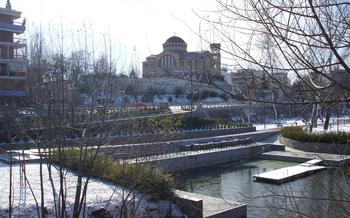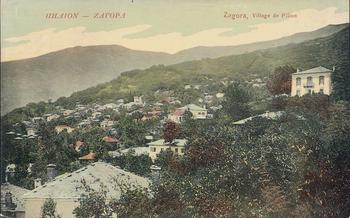
The Bee Museum in Melissatika
- Volos: Gateway to the Aegean's Hidden Gems
- Historical Significance of Melissatika
- The Bee Museum: A Sweet Experience
- Honey and Beekeeping in Greek Culture
- Exhibits and Displays at the Museum
- Exploring the Museum's Bee Garden
- Educational Workshops and Programs
- Sustainable Beekeeping Practices
- Local Honey Products Available
- Tips for Planning Your Visit
- Exploring Volos Beyond the Bee Museum
- Local Festivals and Traditions
- Historical and Cultural Context
- Greek Honey Varieties
- Insider Tip: Hidden Gem Beyond the Bee Museum
Volos: Gateway to the Aegean's Hidden Gems
In the heart of Greece, nestled amidst lush greenery and surrounded by shimmering waters, lies the city of Volos. A vibrant port city with a rich history and cultural heritage, Volos serves as an ideal gateway to explore the hidden gems of the Aegean Sea. Among its many treasures, Volos boasts the charming village of Melissatika, renowned for its beekeeping legacy and home to the captivating Bee Museum. Prepare to immerse yourself in the fascinating world of bees, honey, and the sweet history of Melissatika as we embark on a journey to this extraordinary destination.
Historical Significance of Melissatika
Melissatika, nestled in the verdant hills of Magnesia, Greece, holds a rich and storied past deeply intertwined with the art of beekeeping. Its name, derived from the Greek word for "honey," pays homage to the village's centuries-old tradition of apiculture. Legends whispered through the ages tell of ancient beekeepers who harvested the golden nectar from the region's abundant wild bees. This practice, passed down through generations, has shaped Melissatika's identity and transformed it into a thriving hub of beekeeping activity.
Melissatika's strategic location, nestled between the Aegean Sea and the fertile plains of Thessaly, played a crucial role in its economic prosperity. The village became a significant producer of honey, which was highly valued for its exceptional quality and flavor. Honey from Melissatika was transported far and wide, reaching markets throughout Greece and beyond, establishing the village's reputation as a renowned center of apiculture.
Throughout history, Melissatika has been associated with notable figures who contributed to its beekeeping legacy. One such figure is Aristotle, the renowned philosopher and scientist, who is said to have studied the behavior of bees in Melissatika and wrote extensively about their remarkable social structure and honey-making process. His observations and writings laid the foundation for modern beekeeping practices and solidified Melissatika's status as a hub of apicultural knowledge.
The Bee Museum: A Sweet Experience
The Bee Museum in Melissatika is not just a collection of exhibits; it's an immersive journey into the fascinating world of bees and honey. Through interactive displays, visitors get a hands-on experience of beekeeping, learning about the life cycle of bees, honey production, and the importance of pollination. The museum also showcases the history of beekeeping in Greece, with ancient artifacts and tools that tell the story of this age-old tradition.
But the museum's mission goes beyond education. It actively promotes sustainable beekeeping practices and raises awareness about the vital role bees play in our ecosystem. Educational programs and workshops are organized throughout the year, encouraging visitors to become active participants in the preservation of bees and their habitat.
Honey and Beekeeping in Greek Culture
Honey has held a special place in Greek culture since ancient times. In Greek mythology, honey was associated with various deities, including Zeus, the king of the gods, and Dionysus, the god of wine and fertility. Honey was believed to be a sacred food, a symbol of purity and abundance.
Beekeeping traditions in Greece date back to ancient times. The ancient Greeks developed sophisticated methods for beekeeping, and they were among the first to use movable frames in their hives. Honey was an important part of the Greek diet, and it was used to sweeten food and drinks, as well as to make mead, a type of alcoholic beverage.
Honey also played an important role in Greek medicine. Hippocrates, the father of Western medicine, used honey to treat a variety of ailments, including wounds, burns, and digestive problems. Honey was also believed to have aphrodisiac properties, and it was often used as a wedding gift.
In contemporary Greece, honey continues to be an important part of the culinary and cultural traditions. It is used in a variety of dishes, including pastries, desserts, and beverages. Honey is also a popular ingredient in Greek folk medicine, and it is often used to treat colds, sore throats, and other ailments.
Exhibits and Displays at the Museum
The Bee Museum offers a comprehensive and engaging journey through the world of bees and honey production. Its exhibits and displays showcase ancient beekeeping equipment and artifacts, providing visitors with a glimpse into the historical evolution of beekeeping practices. Visitors can explore the intricate honey production process, from the collection of nectar to the extraction and bottling of honey. The museum also features displays on the diverse honey varieties found in Greece, each with its unique characteristics and flavor profile. Interactive exhibits allow visitors to immerse themselves in the world of bees, learning about their behavior, communication, and the vital role they play in the ecosystem.
Exploring the Museum's Bee Garden
Venturing beyond the museum's exhibits, visitors can immerse themselves in the captivating world of bees in the on-site bee garden. Designed as an educational and interactive space, the garden features a series of observation hives that provide a unique opportunity to witness the intricate workings of a bee colony up close. Through these interactive displays, visitors can observe the bees' diligent nectar collection, honey production, and intricate social interactions.
The garden also serves as a sanctuary for local bee populations, promoting biodiversity and conservation efforts. Bee-friendly plants and landscaping create a welcoming habitat for bees and other pollinators, transforming the garden into a vibrant haven for these essential creatures. Visitors can stroll through the garden, surrounded by the gentle buzz of bees and the sweet fragrances of blooming flowers, gaining a deeper appreciation for the vital role bees play in our ecosystem.
Educational Workshops and Programs
The Bee Museum in Melissatika offers a variety of educational workshops and programs designed to immerse visitors in the world of bees and beekeeping. These programs are suitable for people of all ages and experience levels, from curious beginners to seasoned beekeepers.
One popular offering is the beekeeping course for beginners, which provides a comprehensive introduction to the art and science of beekeeping. Participants learn about bee biology, hive management, honey production, and the importance of bees in the ecosystem. The course includes both theoretical and practical components, giving students the opportunity to work with bees in the museum's apiary under the guidance of experienced beekeepers.
For those interested in sustainable beekeeping practices, the museum offers workshops on topics such as organic beekeeping, pest and disease management, and the use of alternative hive materials. These workshops are designed to help beekeepers reduce their environmental impact and promote the health and well-being of their bees.
Honey tasting sessions are another popular activity at the museum. Participants can sample a variety of honeys from different regions of Greece and learn about their unique flavors and characteristics. The museum also offers workshops on honey cooking and baking, where visitors can learn how to incorporate honey into their culinary creations.
Through its educational programs, the Bee Museum in Melissatika aims to foster a greater understanding of bees, beekeeping, and the importance of honeybees in our environment. These programs provide a valuable opportunity for visitors to learn from experts, gain hands-on experience, and contribute to the preservation of beekeeping traditions in Greece.
Sustainable Beekeeping Practices
The Bee Museum in Melissatika is dedicated to promoting sustainable beekeeping practices that protect the environment and preserve local bee populations. Sustainable beekeeping methods reduce the impact on the ecosystem and ensure the long-term health and productivity of bee colonies. The museum showcases these techniques and educates visitors on the importance of responsible beekeeping practices.
One of the key aspects of sustainable beekeeping is using natural and chemical-free methods to manage beehives. This includes avoiding synthetic pesticides and opting for organic pest control measures. The museum encourages beekeepers to use natural remedies and practices to keep bees healthy and productive, such as essential oils, vinegar, and sugar water.
Sustainable beekeeping also involves providing bees with a healthy and diverse diet. The museum's bee garden is designed to attract a variety of nectar-producing plants and flowers, ensuring a rich food source for bees. Beekeepers are encouraged to plant bee-friendly flora in their gardens and promote local bee-friendly agriculture.
Additionally, sustainable beekeeping practices prioritize the preservation of local bee populations. The museum works with local beekeepers to protect native bee species and prevent the spread of invasive species. By promoting local beekeeping and supporting local beekeepers, the museum contributes to the conservation of local bee biodiversity.
By embracing sustainable beekeeping practices, the Bee Museum in Melissatika sets an example for beekeepers worldwide. The museum's commitment to environmental responsibility and promoting bee-friendly practices helps ensure the long-term sustainability of beekeeping and the preservation of bees for future generations.
Local Honey Products Available
The Bee Museum also features a shop where visitors can purchase a variety of honey-based products, including raw honey, honey-infused cosmetics, candles, and specialty gifts. These products are sourced from local beekeepers, ensuring their quality and supporting the local beekeeping community.
Visitors can immerse themselves in the sweet world of honey by sampling different varieties, each with its own unique flavor and aroma. From delicate wildflower honey to rich, dark thyme honey, there's a honey to suit every palate.
Purchasing honey from the Bee Museum is not just a souvenir, but an act of supporting sustainable beekeeping practices and preserving the region's rich beekeeping heritage. Visitors can feel good knowing that their purchase directly contributes to the livelihoods of local beekeepers and the preservation of the local bee population.
Tips for Planning Your Visit
To ensure a memorable experience at the Bee Museum in Melissatika, meticulous planning is crucial. Consider visiting during the spring or early summer when the weather is pleasant, and the bees are actively foraging. Advanced booking for tickets and guided tours is recommended, especially during peak tourist season. The museum offers insightful guided tours that delve into the fascinating world of beekeeping and honey production. Additionally, keep an eye out for special events and festivals that celebrate the region's beekeeping heritage, providing a unique opportunity to immerse yourself in the local culture.
Exploring Volos Beyond the Bee Museum
Volos offers a wealth of experiences beyond the Bee Museum. Nearby villages, such as Makrinitsa, Portaria, and Milies, beckon with their picturesque cobblestone streets, traditional architecture, and stunning views of the Pagasetic Gulf. Historical sites, like the ancient city of Demetrias and the Frankish Tower, provide a glimpse into the region's rich past.
For culinary enthusiasts, Volos is a paradise. Local tavernas serve delicious dishes crafted with fresh, seasonal ingredients, showcasing the region's culinary heritage. Don't miss the opportunity to savor the local specialty, Volos tsipouro, a traditional Greek spirit infused with anise.
Nature lovers can embark on day trips to Pelion and Mount Olympus, where breathtaking landscapes, lush forests, and charming villages await. Hike through picturesque trails, admire the stunning scenery, and experience the tranquility of nature.
Local Festivals and Traditions
The rich beekeeping heritage of Melissatika and the surrounding region is celebrated through various local festivals and events. During the annual honey festival, held in the summer, visitors can indulge in honey-based delicacies, witness traditional beekeeping demonstrations, and participate in lively competitions. Beekeeping competitions are a highlight of these festivals, where local beekeepers showcase their skills and knowledge, competing for the title of the best honey producer. These events not only honor the beekeeping tradition but also provide a platform for cultural exchange and community bonding.
Historical and Cultural Context
Bees and honey have held a significant place in Greek culture and mythology since ancient times. In Greek mythology, bees were associated with the god Zeus, who was said to have been fed honey by a nymph named Melissa. Honey was also considered a sacred food by the ancient Greeks, and it was often used in religious ceremonies and rituals. In the Orthodox Christian tradition, honey is used to sweeten the bread and wine used in the Eucharist. Bees and honey have also been featured in Greek art and literature for centuries. For example, the ancient Greek poet Homer mentions bees in his epic poems the Iliad and the Odyssey.
Greek Honey Varieties
Greece boasts a diverse range of honey varieties, each unique in flavor and characteristics. Thyme honey, with its amber hue and subtly minty notes, is highly prized for its delicate sweetness. Pine honey, harvested from the fragrant forests of Mount Olympus, offers a rich, robust flavor and a hint of resinous aroma. Citrus honey, produced in the sun-drenched groves of Peloponnese, bursts with vibrant, tangy citrus notes. Wildflower honey, a harmonious blend of nectar from various wildflowers, presents a complex flavor profile that varies with the season and region. Greek honey is not just a culinary delight but also a natural healer. Chestnut honey, with its dark amber color and slightly bitter taste, is renowned for its antibacterial and antioxidant properties. Heather honey, sourced from high mountain regions, is believed to aid digestion and boost immunity. Indulge in the diverse flavors of Greek honey, each a testament to the country's rich beekeeping heritage and the diverse flora that thrives in its landscapes.
Insider Tip: Hidden Gem Beyond the Bee Museum
Just a short drive from the Bee Museum lies a hidden gem that offers a unique glimpse into the region's beekeeping heritage. The Monastery of Agia Triada Tsangarolon stands as a testament to centuries of devotion and craftsmanship. This secluded monastery is renowned for its exceptional honey-making traditions, passed down through generations of monks. Visitors can marvel at the monastery's awe-inspiring architecture, immerse themselves in its rich history, and discover the secrets behind their exquisite honey production. Take advantage of this opportunity to experience the spiritual and culinary essence of the region, venturing beyond the Bee Museum for an unforgettable encounter.









